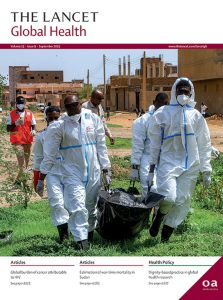Planning for Your CANOE (Circumspect Awareness and Navigation of Outcomes and Expectations) Journey in Community-Engaged Research With Indigenous Communities
Citation
Collins, K. A., Huyser, K. R., & Johnson-Jennings, M. (2025). Planning for your CANOE (Circumspect Awareness and Navigation of Outcomes and Expectations) journey in community-engaged research with Indigenous communities. The Lancet Global Health, 13(9), e1642-e1647. doi.org/10.1016/s2214-109x(25)00262-1
Community engagement is essential when working with Indigenous communities, but researchers often overlook a key question: should they engage with these communities in the first place? This Viewpoint introduces the CANOE (Circumspect Awareness and Navigation of Outcomes and Expectations) approach, which helps researchers reflect on their readiness to engage in research with Indigenous communities. It emphasizes the importance of understanding one’s own position, strengths, weaknesses, and the skills that can be offered. The authors, experienced Indigenous community-engaged scientists, highlight the need for researchers to be intentional, reflexive, and careful before starting a research journey. They also provide self-assessment questions to help researchers evaluate whether they are prepared to establish and nurture meaningful partnerships that respect Indigenous cultures and research protocols throughout the process.
Abstract
Community engagement has long been recognised as necessary for working with Indigenous communities. Although many researchers are excited to engage with communities and many articles describe the process of community engagement in research, almost none have addressed the foundational question of whether researchers should engage with Indigenous communities for research. In this Viewpoint, we will discuss the Circumspect Awareness and Navigation of Outcomes and Expectations (CANOE) approach, which describes what should be considered before embarking on a community-engaged research journey with Indigenous communities. We build on existing literature regarding understanding the need to recognise positionality, practise reflexivity, assess personal strengths and weaknesses, and consider abilities and skills that can be offered or promised to Indigenous partners. Our goal is to provide principles of being reflexive, intentional, and careful before launching into research with Indigenous communities. Drawing from our combined decades of experience as Indigenous, community-engaged scientists leading national and international community projects, we draw from the extant literature and lessons learned in the field to provide a guiding CANOE approach for community-engaged research. This Viewpoint provides researchers interested in community-engaged projects with the information they need to consider before embarking on their research journey. We provide a set of CANOE self-assessment questions designed to evaluate a researcher’s preparedness, suitability to invest in a research partnership, and adaptability to navigate a research journey with Indigenous communities. Not only should relationships be properly developed and nurtured, but researchers need to fundamentally understand their ability to develop research partnerships that prioritise Indigenous cultural worldviews and protocols in research design, development, testing, and implementation.
